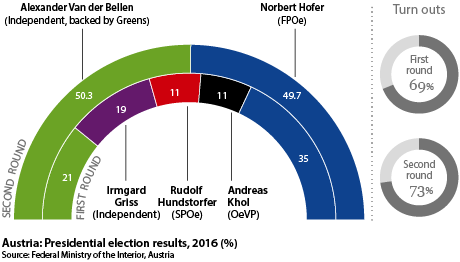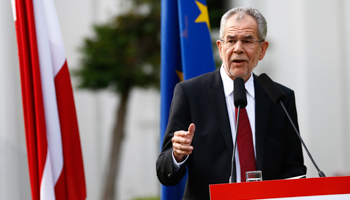Divided vote raises pressure on Austria's government
The newly elected President Van der Bellen is likely to play a more active role than his predecessors
On May 23, Alexander Van der Bellen, an independent candidate backed by the Greens, was declared winner of Austria's presidential election. In the final run-off round that took place on May 22, Van der Bellen won 50.3% of the votes. His opponent Norbert Hofer, candidate of the populist far-right Freedom Party (FPOe), was narrowly defeated after postal ballots were counted, with 49.7%.
What next
Van der Bellen will have to work hard to heal the divisions in Austrian society and respond to the feeling of frustration that has brought the populist right-wing close to half of the vote. The next general election -- scheduled for autumn 2018 -- could well see the FPOe in a position to claim to enter government. The result is a wake-up call for the EU, which has been confronted with a rise in Euroscepticism in several member states.
Subsidiary Impacts
- Despite Hofer's defeat, the election was a success for the FPOe and will cement its position in the political mainstream.
- The success of the FPOe is likely to serve as inspiration for like-minded parties in France and Germany.
- Unless the government initiates overdue reforms to end political and economic stagnation, the FPOe may continue to grow in popularity.
Analysis
For the first time in post-war Austria, neither of the candidates from the two governing parties, the Social Democrats (SPOe) and the People's Party (OeVP), reached the final round. Both were defeated in the first round on April 24, leading to a run-off between Hofer and Van der Bellen.
Traumatised by its poor performance in the first round, the SPOe underwent a spectacular change of leadership. Werner Faymann, the federal chancellor and party leader, unexpectedly resigned on May 9. He was replaced by the head of Austria's federal railway company, Christian Kern, who promptly made changes to his ministerial team.
The campaign
The election campaign was driven by clashes between supporters of the FPOe and Van der Bellen, whose views on migrants, border management, the EU and the office of president itself are diametrically opposed (see AUSTRIA: Migration U-turn will cause further conflict - March 10, 2016). A television debate between the two candidates without a moderator degenerated into undignified mud-slinging.
The acrimonious campaign exposed major fault lines in the political landscape
Incumbent President Heinz Fischer (SPOe) is well liked, but the party has not gained from his popularity. It suffered a haemorrhage of support in its strongholds, including legendary 'Red Vienna', named after the party's colour.
For the second round, both candidates had to appeal to a broader section of the public while retaining their initial support. Blue-collar male workers favoured the FPOe and young women and those with higher educational attainment tended to vote for Van der Bellen.
The main reason given by voters for supporting Van der Bellen was that he was the best person to represent Austria abroad, while those favouring Hofer felt he understood their worries.
Support for Van der Bellen
Van der Bellen had much ground to make up -- Hofer's 14-percentage point lead in the first round was a formidable challenge -- but he was successful in gaining the public support of several leading politicians, including Kern as well as Irmgard Griss, the independent candidate defeated in the first round.
Neither the SPOe nor the OeVP officially endorsed either candidate
European Commission President Jean-Claude Juncker came out for Van der Bellen, as did President of the European Parliament Martin Schulz, who warned against right-wing extremism gaining the upper hand in Europe (see EU: Populism will not threaten European institutions - October 23, 2013).
During the campaign, Hofer was at pains to explain that he did not support Austria leaving the EU, unless Turkey were to join at some point in the future. He spoke of a Europe based on the principle of subsidiarity, which contrasted with Van der Bellen's vision of an even more united and integrated EU.
Van der Bellen criticised Hofer for aiming at the destruction of the current EU project, which would, he said, put jobs in Austria at risk, among other things.
Federal president's powers
Another key issue during the campaign was the interpretation of the president's powers, which to date have been exercised with considerable caution. The president is head of the armed forces and has the right to appoint the chancellor.
Past presidents have resisted the temptation to test how far their powers may stretch in practice, but both Hofer and Van der Bellen had hinted that they would make greater use of their position as president. Hofer, to the dismay of many, surmised that people would be surprised by what a president could really do.
Van der Bellen has suggested that he would use his powers to a greater extent than his predecessors have
Van der Bellen did not go so far, but suggested that he would not ask a party hostile to Europe and human rights to form a government. This could cause problems should the FPOe win the next general election.
Outlook
Usually a routine affair for a largely ceremonial post, this presidential election was a milestone, highlighting a number of developments:
- the end of the post-war party system dominated by the SPOe and the OeVP;
- the rise of new challengers gaining cross-party support using social media and crowdfunding instead of a party apparatus;
- a structural shift of power in the SPOe from Vienna to provincial state organisations; and
- endemic weaknesses in the SPOe and OeVP on personnel and policies.
The new president will be sworn in at the beginning of July for a six-year period. Van der Bellen has declared that he will reach out to people outside Vienna and the urban areas where much of his support lies. He is likely to follow the moderate style of Fischer in an effort to pull the country together.
Differences between the young and the elderly, rural areas and cities, skilled and non-skilled workers need to be addressed. Both Van der Bellen and Kern know that this election contains an important message that they cannot afford to ignore.
Van der Bellen and Kern will need to address divisions in society
The ruling coalition is on shaky ground, as the SPOe rethinks its position on how to deal with the FPOe. So far, it has rejected cooperation at the federal level with a party regarded as xenophobic and hostile to the EU. However, coalitions have been formed at the regional level and the rise of the FPOe makes it a force to be reckoned with.
The OeVP does not rule out cooperating with the FPOe, but is unsure how to compete with Kern's new-style leadership. Changes in personnel may be one answer.

